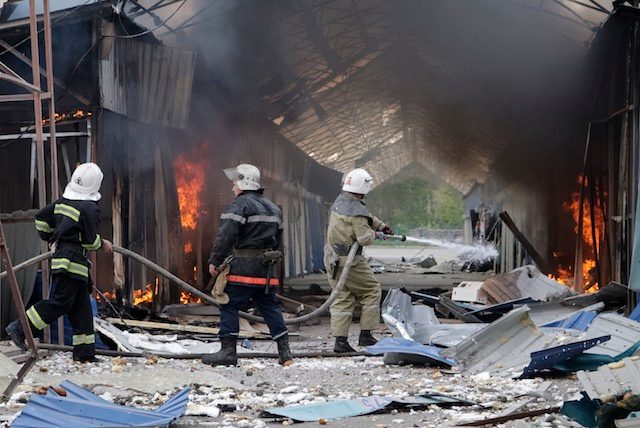SUMMARY
This is AI generated summarization, which may have errors. For context, always refer to the full article.

KIEV, Ukraine – Ukrainian President Petro Poroshenko warned Thursday, June 4, of the “colossal threat” of a resumption of major clashes in eastern Ukraine where at least 24 people have died in renewed fighting between government forces and pro-Russian rebels.
Fresh clashes erupted near the rebel stronghold of Donetsk on Wednesday, June 3, reviving fears in Kiev that the separatists may be gearing up for a new push into government-controlled territory, 4 months after agreeing to a truce.
“There remains a colossal threat of resumption of large-scale fighting on the part of Russian terrorist groups,” Poroshenko said in his annual address to parliament, referring to the insurgents.
Poroshenko alleged that more than 9,000 Russian soldiers were now in east Ukraine, to support the rebellion.
The EU expressed alarm over the escalation, calling it “the most serious violation” yet of the February ceasefire.
The Kremlin accused Kiev of seeking to torpedo the truce ahead of an EU summit in June which will discuss whether to extend sanctions against Russia set to expire in July.
“No doubt these provocations are being organized by the Ukrainian army,” Russian President Vladimir Putin’s spokesman Dmitry Peskov told reporters.
“We are seriously worried by this indeed.”
The hot-button issue of Russian sanctions is also expected to come up at a Group of Seven summit in Germany this weekend.
The United States, which has also hit Moscow with stinging sanctions, said it was disturbed by the new clashes, warning that if the crisis escalated Moscow would face punishment.
A senior separatist commander, Eduard Basurin, told Agence France-Presse that 14 rebels and five civilians had died over the past 24 hours.
An estimated 24 civilians and 86 rebels had also been wounded, he told reporters.
Kiev authorities said that 5 soldiers had been killed and 39 wounded in the latest upsurge in fighting.
The army on Wednesday accused pro-Russian forces of launching a large-scale attack on the settlement of Maryinka, just west of the rebel stronghold of Donetsk, in breach of the 4-month-old truce brokered by the West.
The fighting had died down on Wednesday afternoon and authorities said on Thursday they were clearing mines and unexploded shells.
“It’s quiet in Maryinka now,” a Ukrainian military spokesman, Olexandr Paranyuk, told Agence France-Presse.
Separatist forces denied that they had gone on the offensive, saying they had reacted to defend their people from a “genocide.”
‘Constant threat’ to peace deal
Speaking in Moscow on Thursday, Russian Foreign Minister Sergei Lavrov said the peace deal faced a “constant threat” from the Ukrainian authorities.
“The February 12 Minsk agreements are under constant threat of breaking down because of the actions of the Kiev authorities who are trying to avoid fulfilling their obligations to establish direct dialogue with the Donbass,” Lavrov said, referring to the rebel-controlled territory.
The Kremlin on Wednesday accused the Ukrainian army – which admitted Wednesday to using heavy artillery against the rebels – of “provocative actions.”
Russia denies that it is behind the fighting in Ukraine that has killed 6,400 people since April 2014.
Kiev and the West accuse Moscow of backing the Russian-speaking rebels with weapons, money and troops.
Moscow has denied the claims despite mounting evidence to the contrary, including secret funerals of Russian soldiers.
The United States said on Wednesday it was disturbed by the reports of new clashes, warning Moscow of consequences if the Ukraine crisis escalated.
“Any attempts to seize additional Ukrainian territory will be met with increased cost,” said State Department spokeswoman Marie Harf.
The renewed violence caused the Russian ruble to tumble, losing about 3 percent of its value against the dollar and the euro, its lowest level in two months.
February’s ceasefire was agreed by the leaders of Russia, Ukraine, France and Germany after negotiations in the Belarussian capital Minsk. – Olga Shylenko and Dmytro Gorshkov, AFP / Rappler.com
Add a comment
How does this make you feel?
There are no comments yet. Add your comment to start the conversation.